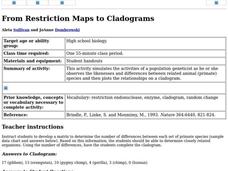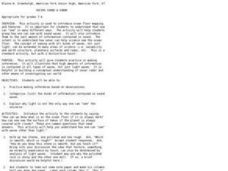Curated OER
In My Own Backyard
Students explore the soil and vegetation found in their home and/or school environment and map a familiar area. Each group is assigned a section of the schoolyard. They draw maps of their assigned places and gather soil and vegetation...
Curated OER
Salad Tray 3D Topographic Model
Students explore the characteristics of topographical maps. They examine the relationship of contour lines and vertical elevation. Students create a three-dimensional model of a landscape represented by a topographic contour map.
Curated OER
Snack Search
Students make maps to show where the agricultural products used to produce various packaged snacks are grown. They bring in snacks from home and utlize a worksheet imbedded in this plan.
Curated OER
Mapping Lab and Lead Poisoning
High schoolers are introduced to GIS and its uses. They make predictions before viewing the actual lead poisoning cases by location of Dade County. Pupils use actual Miami-Dade County spatial data to explore basic principals. Students
Curated OER
Using Maps to Make Public Health Descisions Case Study: Harmful Algal Blooms in the Gulf of Mexico
Students are introduced to GIS and its uses. Students participate as public health scientists to deliberate a course of action to explore possible research questions. Pupils interpret spatial data, and make predictions based on GIS data,...
Curated OER
Classifying Living Things
Students identify how to classify living things. They classify various concepts including family members, kinds of clothing, numbers, shapes, and vocabulary words. They discuss how to classify various concepts and classify pictures of...
Curated OER
Earth Science: In Depth Look at Earthquakes
Learners engage in an interactive Internet instructional activity covering the reasons and results of earthquakes. After reading eyewitness accounts and viewing animations, they use seismograms to measure and locate the epicenters. In an...
Curated OER
From Restriction Maps to Cladograms
Students develop a matrix to determine the number of differences between each set of primate species. They determine closely related organisms then complete the cladogram and answer a set of questions.
Curated OER
Mapping the Homunculus
Students determine the relative number of nerve endings located in the skin. By calculating the reciprocal of these measurements, students have the appropriate data for predicting the relative size of the homunculus found on the cerebral...
Curated OER
Science: Hurricanes As Heat Engines
Students conduct Internet research to track the path of Hurricane Rita. They record the sea surface temperature of the Gulf of Mexico during and after the hurricane and draw conclusions about how hurricanes extract heat energy from the...
Curated OER
Research Question - Greenhouse Gas Emissions
Students review information from concept map to identify possible causes of greenhouse gas emissions, choose factor that they feel is largest contributor to greenhouse gas emissions in their town, and write research question on topic.
Curated OER
Mass Matters
Fourth graders, in pairs, explore the relationship between a star's life and its mass. They use a concept map to illustration the three categories of stars.
Curated OER
Animals of Rainforest and Temperate Forest
Students research an animal from each type of forest, and compare/contrast them on a concept map. They write a letter from one animal to the other, using information from their research.
Curated OER
The Five Senses
Students explore and study about the five senses. They focus on their sense of smell and interact with certain ingredients, including white vinegar. Each student also helps to create and share a concept map on the sense of smell...
Curated OER
Weathering and Erosion
Sixth graders discuss the differences between chemical and mechanical weathering. Using that information, they create a concept map showing the forces that cause these types of weathering. After participating in an activity, they...
Curated OER
The Class Trip
Mrs. Moore's class is trying to earn money for a trip to the science museum, but how much more do they need? Solve this problem with your own class as they develop their ability to model real-life situations algebraically. As an added...
Curated OER
The Bear Facts
Students explore various kinds of bears and gather information about them. In this research and habitats lesson, students chart their bear information on large posters with illustrations of their bears. Students map the...
Curated OER
Learning About Location: Charting the Path of the George W. Elder
Young scholars acquire a working knowledge of the geographical concepts: absolute location, relative location, longitude and latitude. They analyze primary sources that shows the physical and human characteristics of the places along...
Curated OER
What Is the Matter?
Students explore and identify phases of matter and compare the particle motion in solids, liquids, and gasses.
Curated OER
Seeing Sound & Sonar
Students make inferences based on different sounds that they hear. In this inferences lesson plan, students will hear sounds of different objects and describe the sounds based on what they hear. They will answer various questions about...
Curated OER
Where in the World? The Basics of Latitude and Longitude
Students are introduced to the concepts of latitude and longitude. In groups, they identify the Earth's magnetic field and the disadvantages of using compasses for navigation. They identify the major lines of latitude and longitude on a...
Curated OER
You Can Die Here – Death Valley California
Students use Google Maps to explore the rain shadow desert. In this climate lesson, students use the Internet, Google Maps, and directed inquiry worksheets to understand how rain shadow deserts form. Students apply climate concepts to...
Curated OER
Exploring Our Watershed System
Students study watersheds and examine how they are composed. In this watershed system lesson students explain how water enters a watershed and the concept of stream order.
Curated OER
Weather Prediction
In this weather worksheet, students review vocabulary words and concepts associated with predicting the weather. Students understand what a meteorologist studies. This worksheet has 7 matching, 10 fill in the blank, and 5 short answer...

























